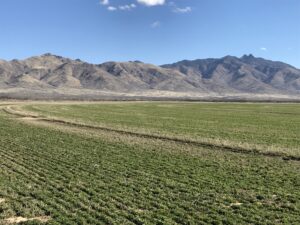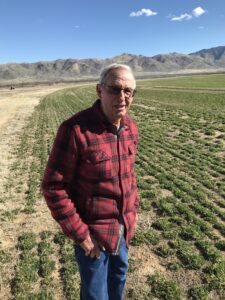 Kathy and Toby Collins met in high school when both of their families started farming about six miles south of Wilcox, Arizona. They have been married, according to both of them, for “64 blessed years”. There are not many family farms left in the valley. A dairy came in and bought up a lot of the land. The Collins farm, up against a low range of mountains on the east side of the valley, have enough water to irrigate their crops of alfalfa hay, but other parts of the valley keep having to drill deeper and deeper for water. Their daughters have moved away and both have successful careers and families of their own. Their son now runs the farm; Toby, 84, “retired” a month before I interviewed them, but admits that the next day he was out on the tractor. Kathy sat with us for awhile, but then she drove to town where she is the pianist for the church choir. After we chatted for an hour, Toby drove me around the farm in his old pickup and gave me a detailed lesson in wells, pumps, pivot irrigation systems, and alfalfa.
Kathy and Toby Collins met in high school when both of their families started farming about six miles south of Wilcox, Arizona. They have been married, according to both of them, for “64 blessed years”. There are not many family farms left in the valley. A dairy came in and bought up a lot of the land. The Collins farm, up against a low range of mountains on the east side of the valley, have enough water to irrigate their crops of alfalfa hay, but other parts of the valley keep having to drill deeper and deeper for water. Their daughters have moved away and both have successful careers and families of their own. Their son now runs the farm; Toby, 84, “retired” a month before I interviewed them, but admits that the next day he was out on the tractor. Kathy sat with us for awhile, but then she drove to town where she is the pianist for the church choir. After we chatted for an hour, Toby drove me around the farm in his old pickup and gave me a detailed lesson in wells, pumps, pivot irrigation systems, and alfalfa.
Toby: “We came out here in 1952. I was thirteen. We came from a little town called Trent, Texas, near Abilene. Our family was ranchers and farmers there. We had three years of drought in a row. My father sold and moved out here. This was dry land farming down here. They had pretty good rain for three or four years. And then after that not so much, so everybody went to irrigation. We grow mostly hay now. Kathy and I met in high school. She went away to college and I followed her, but my dad called one day and asked if I wanted to come home and farm and I just finished the semester and came back.”
Kathy: “My dad was a farmer in Tucson. His biggest field was 60 acres; he could just barely turn his tractor around. So this looked real good to him out here. He bought a house in town because my mother wasn’t about to let us take this bus 17 miles every day. Toby worked a lot on the farm. My brothers worked. The girls didn’t have to work out there. We did live out on the farm in the summer, and we loved it. But I really didn’t have any responsibilities. My dad had this feeling that girls don’t do that. My mother really expected me to go to college. That was really important to her. She had struggled to try to get a degree, which she never did.”
Kathy: “I think one of the things that impacted me a lot over my young years is how hard people work on a farm. This work is hard physically and mentally and emotionally. We hardly ever saw my dad. He did come home for lunch. And he had his shop there on our place. We hung around the shop; he had the old blacksmith forge and anvil and I think, oh my gosh, that’s hard. And you didn’t get paid till the end of the year. You don’t know how much you are going to make and then you have to make that last through the next year.”
Kathy: “My mom went to a Methodist church and we went with daddy to Catholic church. Daddy volunteered at the church, lots of different things. They were building all the time; they had a school, too and so he and the other guys in the church, there were some carpenters and electricians and everything. They’d say, ‘Well, we’ve got to build another school building’, and they would just do it. No contractors! It was a wonderful time. The women would fix meals for the men. It was just a neat thing.”
Kathy: “I think there was some prejudice here. I don’t remember feeling any in Tucson. There are a lot more Mexican kids here in school. Two of my best friends were Mexican girls. Back then most of the Mexican families were laborers. Now our Mexican families are pretty well established. Many own businesses and they are at every level of society. I don’t feel there’s any prejudice at all now.”
Kathy: “My mother talked to us a lot about prejudice and how to treat people. Here’s something I remember that I think reveals some prejudice in my own thinking, which I hate to admit. The first Sunday that I went to church here two Mexican girls came up and introduced themselves to me. And I was just overwhelmed. You know, I thought, well how nice, a 12 year old kid and these two girls came up and it was just before school started and so they decided I was probably about their age. I don’t remember thinking I was prejudiced. But at that time I wouldn’t have expected Mexican girls to come up to me like that.”
Toby: “We’re not any different from anybody else. That’s the way I look at it. It doesn’t matter what color you are, what kind of language you speak. We’re all human beings. And we’re all interested in God. And that’s just what I feel.”
Kathy: “We’re not accepting enough of differences. We notice differences. And rather than noticing similarities, and creating a bond with the similarities, we notice a difference and create space between us, because of those differences. I don’t know why we do that. Maybe because we are too concerned about ourselves individually about, you know, my rights, my wants, my desires, my money, my life. And how did we get that way? I don’t know. Is it true of us from the beginning of humankind, that we only thought of ourselves, or thought of ourselves first? On the news you’re seeing differences, not similarities. The differences make the news.”
 Toby: “My dad, before he started farming, was a preacher, a Methodist preacher. He had several churches around the Texas panhandle, and then over into Oklahoma. He was a true Christian. My mother was too. The main thing they thought was to look after other people, make sure lives are okay in the community. Make sure the schools were good. It doesn’t matter if other people believe what you believe or if they are religious. No, it was because we’re humans. I think that we have to treat all people equal. I really do believe that. A lot of good people don’t go to church. You don’t have to be religious to love everybody. That’s just the way I feel.”
Toby: “My dad, before he started farming, was a preacher, a Methodist preacher. He had several churches around the Texas panhandle, and then over into Oklahoma. He was a true Christian. My mother was too. The main thing they thought was to look after other people, make sure lives are okay in the community. Make sure the schools were good. It doesn’t matter if other people believe what you believe or if they are religious. No, it was because we’re humans. I think that we have to treat all people equal. I really do believe that. A lot of good people don’t go to church. You don’t have to be religious to love everybody. That’s just the way I feel.”











Leave A Comment